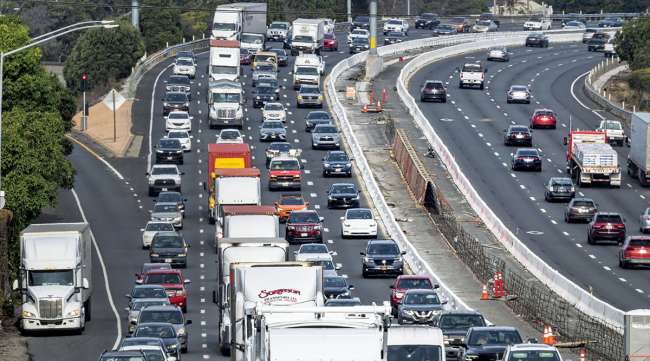Senior Reporter
Questions Linger About Enforcement of California AB 5 Law

[Stay on top of transportation news: Get TTNews in your inbox.]
The California AB 5 independent contractor law is more than 4 years old, but how and to what extent it’s being enforced across the trucking industry remains an open question.
The law has been mired for years in legal challenges led by the California Trucking Association, the most recent of which was rejected by an appeals court. While CTA is weighing next steps, industry observers say the outlook for practical application of the law remains muddy.
“I’m not aware of any state enforcement against any companies,” said Richard Pianka, American Trucking Associations’ general counsel. “But it’s a big old world, and I would not want to say that there hasn’t been. It could be that the state is waiting until this litigation has played out before it went down the path of enforcement.”
In January of last year, CTA asked federal district Judge Roger Benitez to temporarily block enforcement of the law that it said “effectively eliminates owner-operators from any role in motor transport in California.” However, Benitez in a March 15 ruling denied the request and said the AB 5 law “does not run afoul of federal statute.” That request for review came after a federal appellate court rejected an earlier CTA attempt to stop enforcement of AB 5, as well as the U.S. Supreme Court’s refusal to hear the case.

Pianka
In its legal filings, CTA has claimed that the law’s three-pronged “ABC” test for worker status determination cannot be enforced against the trucking industry. The B-prong requires that an individual — an owner-operator as it relates to trucking — is customarily engaged in an independently established business. CTA has argued that AB 5 will force owner-operators to become motor carrier employees.
There are indications that state officials could at some point pursue legal actions or initiate audits against motor carriers for misclassifying independent operators. Prosecutors already have pursued legal actions against Uber and Lyft for misclassification, but so far there are no reports of action against truckers.
“We have seen no evidence of audit enforcement, such as might occur with the state’s Division of Labor Standards Enforcement,” said Gregory Feary, managing partner of the Indianapolis-based trucking law firm of Scopelitis Garvin Light Hanson & Feary. “That’s where you would likely see some type of audit enforcement.”
ABC Test
The three-pronged ABC test dictates that a worker is considered an independent contractor to whom a wage order does not apply only if the hiring agency establishes:
► (A) That the worker is free from the control and direction of the hirer in connection with the performance of work, both under the contract for the performance of such work and in fact.
► (B) That the worker performs work that is outside the usual course of the hiring entity’s business.
► (C) That the worker is customarily engaged in an independently established trade, occupation or business of the same nature as the work performed for the hiring entity.
He also noted there is some room for interpretation of AB 5.
“There’s no law that says you have to voluntarily subject yourself to either the ABC test or the [business-to-business] exemption to determine where you stand — or self report,” he said. The AB 5 B-to-B exemption allows providers who are established as a “sole proprietorship, partnership, limited liability company, limited liability partnership or corporation” to enter a contractual arrangement with a business. However, a business must meet 10 requirements to claim the exemption.
“It is prudent to detect where you might land if there is an audit, or if there was some type of a litigation action,” Feary said. “Certainly many motor carriers are asking that question. But the law doesn’t require them to take [the ABC test].”

Spencer
“We’re not aware of any enforcement activity related to this,” said Todd Spencer, president of the Owner-Operator Independent Drivers Association, which joined CTA in the recent legal challenge. “Early on, enforcement was set aside by the courts. Since then, we have not heard anything.
He added, “California has been really, really frustrating in that since passage of this legislation some four years ago, we struggle to get anybody within the state to tell us how you comply. That’s still a quandary that we have.”
For its part, the state is happy that the law has withstood legal scrutiny.

Bonta
“We’re pleased that the district court got this one right and upheld AB 5’s protections,” California Attorney General Rob Bonta said in response to the March 15 ruling. “This attempt to invalidate the application of AB 5 to the trucking industry will not stand. The California Department of Justice will continue to defend this important law and stand up for the rights of workers to receive the benefits and protections to which they are legally entitled.”
In July 2022, more than 70 trade associations representing wide-ranging supply chain interests sent a letter to California Gov. Gavin Newsom asking him to issue an executive order to temporarily pause enforcement of the state’s AB 5 contractor law. The letter, signed by trade organizations — including ATA — representing interests ranging from trucking and retail to agriculture and business, also asked Newsom, a Democrat, to immediately call labor and industry to the table “to negotiate a path forward to preserve small business trucking in the state of California and prevent further disruptions to the supply chain.”
“Experienced drivers, such as the typical owner-operator, are in high demand and could easily secure employment as company drivers,” the letter said. “However, owner-operators are independent by choice for reasons related to freedom, flexibility and economic opportunity.”
Want more news? Listen to today's daily briefing below or go here for more info:




